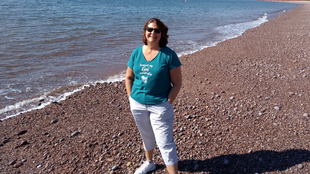How our research volunteers are helping shape our ovarian cancer research

Research Network volunteer, Katharine
Ovarian Cancer Action was founded in 2005 to raise awareness, fund much-needed research, and give a voice to all those affected by the disease. We have been working ever since, driven by a clear vision - a world where no woman dies of ovarian cancer.
The biggest impact we can make comes from our main area of focus: scientific research. Since 2006, Ovarian Cancer Action has funded £12.3 million of research projects: more than any other ovarian cancer charity in the UK.
But how do we make sure we are funding research that will have the biggest impact on women affected by ovarian cancer? The answer is our amazing Ovarian Cancer Action Research Network.
Our research network is made up of over 100 experts by experience who have been affected by ovarian cancer and have a research interest. This includes women who have or have had ovarian cancer and women with a BRCA mutation.
How do we involve our research volunteers?
- Review our research funding applications that we receive from scientists to make sure they are relevant to women affected by cancer and have considered their research through a participant point of view
- Work directly with researchers to help guide the progress of research projects.
- Help to develop appropriate materials for research participants, such as patient leaflets and questionnaires.
- Involving volunteers in our research this way ensures we are spending supporters' donations on the best research that will have the biggest impact on women affected by ovarian cancer.
Two members of our research network explain how they use their experience of ovarian cancer to shape our work and why they think including the patient's voice in research is so important.
Katharine’s research volunteer experience
“I have worked on some research papers, looking at how easily someone who has ovarian cancer might understand the way the researchers explain their pitch for funding. I also looked at information that was proposed to be given to newly diagnosed ovarian cancer patients to see if the tone was right.
It made me feel useful and involved, as though I still had a brain and was a functioning, useful member of society, and had a purpose. I also hoped it would be of help to those coming after me.
I think it's empowering to involve patients in research, and I strongly believe in finding out as much as possible about the potential treatments available and being discovered. My particular type of ovarian cancer (Granulosa cell tumour) is particularly rare, so I need to know what's emerging across the world in terms of new treatments. I feel it also gives back some sense of control and a feeling of usefulness in a world where it's easy to feel out of control and that your life has less meaning than before.
Being involved in research decisions is vital, as we patients understand firsthand the effect of getting a diagnosis of cancer, the anxiety of waiting for scan results, and what going through treatment is like for both the individual and the family and friends around us. We also have to make decisions on treatment, and that's why we should all know as much as possible”.
Alex’s Research volunteer experience
“I was diagnosed as part of “elective” surgery and I was given a life-changing operation to save my life. It wasn’t until after my treatment that the medical team could confirm that I had been stage 1 and no further treatment was necessary. I lost my reproductive system before I had the chance to use it. Admittedly I was in my late 30s and it was by no means a done deal on the parenthood front. But if there had been a more subtle way to reach the same conclusion I may have been able to have my own family.
I am VERY lucky to be here – my ovarian cysts, misdiagnosed IBS and endometriosis saved my life. I had to fight and fight to get treated and I’m very glad I did. If OCA can continue to support the development of less radical treatments and early-stage screening tools it will mean that women like me will become a thing of the past. It’s important to me that no one should have to decide their reproductive future in such an urgent and alarming way.
As a survivor, I am best placed to understand the treatment on offer and what needs to change. Having gone through the experience of treatment I am able to inform about the ways in which treatment can be kinder. What approaches worked for me and how I have overcome the inevitable fallout from such a diagnosis? If I can influence research into the root causes of these conditions I might be able to help in preventing them for future patients”.
You can visit our website here to read about the vital research we are funding, or here to sign up to the Ovarian Cancer Action Research Network.